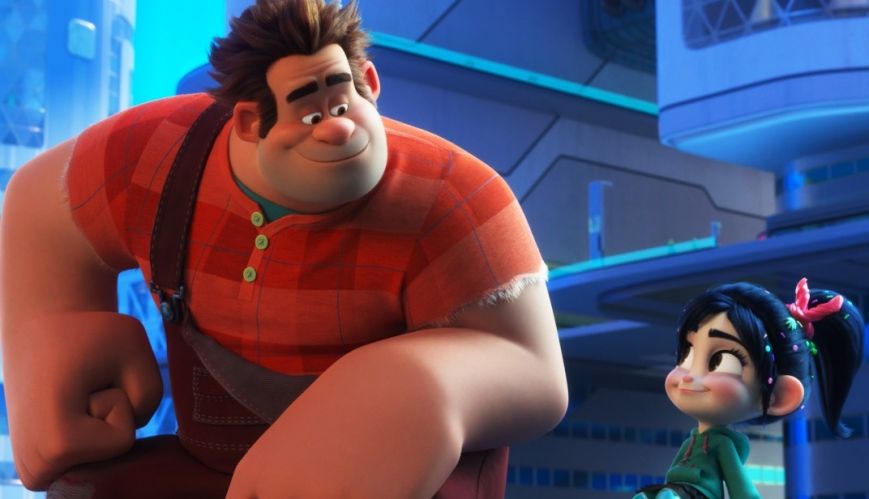God's story in summer blockbusters

God's story in summer blockbusters
11 January 2019
Ralph Breaks the Internet is no pallid repeat. It’s as fresh as the first, and has another unorthodox lesson to teach kids and adults alike.
There’s a fantastic variety of films awaiting Australians these holidays, as we indulge in one of our favourite summer pursuits and head to the movies.
However, look closely and you’ll see that even in our increasingly secular society, there are spiritual messages that insist on floating to the surface. Christmas might have become separated from the baby in a manger, but, says Others culture writer Mark Hadley, you can still find God’s good news in multimillion-dollar productions
RALPH BREAKS THE INTERNET
Wreck It Ralph was always going to be a hard act to follow. It was not only a great concept with likeable characters, it covered territory children’s films had so far almost neglected.
The star role handed to Vanellope, a disabled cartoon character, was a welcome boost to many families. The good news is, Ralph Breaks the Internet is no pallid repeat.
It’s as fresh as the first, and has another unorthodox lesson to teach kids and adults alike. Ralph Breaks the Internet picks up six years after the first story.
Ralph, who has a talent for smashing things, is revelling in his friendship with racer Vanellope. However, when her arcade game gets busted, they must venture through the door labelled “Wi Fi” to secure the internet’s only available spare part. 
Travelling the information superhighway together allows for the pair to interact with a hilarious series of internet memes, but the most valuable lesson comes when the opportunities presented threaten to pull them apart.
Ralph’s focus is getting things back the way they were before. “Change” is a complication he’d rather not entertain.
However, his determination to keep things the same is a dependency that leads to destructive behaviour. And the tension goes up a notch when a dangerous virus identifies Ralph’s ‘insecurity’ and decides to exploit it.
Ralph believes he’s acting for Vanellope’s own good. Jesus would have easily diagnosed Ralph’s problem as not being prepared to, “Love your neighbour as yourself”.
True friends help their companions achieve their goals, as though they were their own. In fact, it’s this sacrificial serving of each other’s interests that actually builds a relationship.
As another character observes, “All friendships change, but the good ones get stronger for it.” Frankly, these are awesome lessons for kids to learn, and not least because they come with biblical backing.
But underneath the whole story lies the additional gospel truth that even in our best situations, we continue to mess up. Like Ralph, sin just loves to wreck things.
MARY POPPINS RETURNS
if you’re looking for a trip down memory lane, then Mary Poppins Returns is likely to be just the ticket.
More than 50 years after the original Mary Poppins, Disney has delivered a singing and dancing extravaganza that doles out every bit of delight its classic forerunner had to offer.
Mary Poppins Returns is set 20 years after the original storyline, during which the magical nanny descended from the skies to help the stressed Banks family. Two decades on, the problem is much the same.
Michael Banks was a child in the first film and has grown up to become a single parent struggling to hold on to the family home. Michael lost his wife a year earlier, but still strives to hold his three young children close even as the bank threatens to foreclose. 
Their loan’s looming deadline threatens to destroy their happiness – until Mary Poppins arrives to restore the balance with her strict sense of nonsense. Emily Blunt is captivating as P.L. Travers’ legendary character, but it’s hard not to feel as though director Rob Marshall has skipped over ‘tribute’ to produce a photocopy of the original film.
Mary Poppins Returns is unceasingly optimistic in its outlook (which is encouraging), but sometimes to the point of glossing over sad and serious issues (which is not).
Mary Poppins teaches the children that the best things are never really lost, and Michael’s youngest boy brightly reminds his father that this applies to his deceased wife as well. “Of course, you’re right!” he replies, instantly cheered. “Your mother’s not gone. She’s in your smile, Georgie.”
If there’s one part of the Gospel that you can rely on Mary Poppins to get right, though, it’s our tendency to get sidetracked by life’s cares and concerns, at the expense of the truly important things.
We need help to find our way out of our troubles. Lamplighter Jack might spend the film pointing to Mary Poppins, but at least he gets it right when he says the best we can hope for is “blessings from up above”.
VICE
Vice is a stunning political drama that follows the rise to power of Dick Cheney, the United States’ most powerful vice president.
The story picks up in 2000, during George W. Bush’s race for the White House. Bush surprises analysts by selecting consummate Washington insider Cheney as his running mate.
But if Vice is to be believed, Cheney wasn’t bowled over by the offer: “Well, George, I’m a CEO of a large company. And I have been Secretary of Defence. And I have been White House Chief of Staff. The Vice Presidency is a mostly symbolic job. However, if we came to a different understanding ... I can handle the more mundane jobs - overseeing bureaucracy, the military, energy and foreign policy?”
The particular “vice” at the heart of Vice is Cheney’s unquenchable desire for power. The more he accumulates, the more ruthless he becomes.
He is pictured as regularly providing the last word that shapes the policies of a gullible president, and his influence is regularly put at the service of big business. 
His eventual soft exit from the story might suggest, as some have feared, that God does not take into account their actions. But Psalm 92 promises us the lush gains they seem to make are only temporary: “Though the wicked spring up like grass and all evildoers flourish, they will be destroyed forever” (Psalm 92:7).
You and I might leave the cinema wondering that Cheney could get away with it all, but the fact that Vice exists as a film suggests something else.
Even Hollywood recognises that our secret actions will one day become known, and we will have to bear the consequences.
So, when the lights come up these holidays, what are we left with?
The Gospel in gorgeous technicolour. Ralph teaches us we’re capable of wrecking even the best situations and Mary Poppins reminds us we need help. Yet if we don’t learn the lessons inherent in Vice, we’re certain to face the outcome. It’s not exactly how the Bible puts it, but the pieces are there if you know where to look.